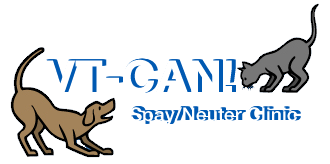Medical Concerns/Emergencies: Please call or text (802) 272-4925 or email info@vt-can.org (up until about 7:00 p.m.) if you have a medical concern (do not call or text this number unless your pet had recent surgery). If you get voicemail, please leave a message. If no one has returned your call in 20 minutes, please try again. If you feel you have a dire emergency and need to be seen right away, please call your own full-service vet, BEVS in Burlington at (802) 863-2387 or an emergency veterinary hospital near you.
Post Surgery
1) Restrict dogs’ activity until the incision heals (10 days). This means leash walking while outdoors, and NO running or jumping or rough play. A crate is a good option for overly active crate trained dogs.
2) Keep your dog inside, warm, and dry tonight. Towards evening give the dog water and half the normal amount of food. If your dog is a puppy, feed the normal amount tonight, at your puppy’s regular feeding times. Do not worry if your dog does not eat tonight, but s/he should be eating, drinking and acting fine within 24 hours after surgery.
3) Check incision daily for swelling, drainage, heat, or pain. There are no sutures (stitches) to remove. All sutures are absorbable and will dissolve in about 4 weeks. Please call us if you are concerned about the incision. Some dogs will develop a hard, small lump at the incision site. This is caused by a slight reaction to the stitches or scar tissue. It will usually go away in a month or so, but some dogs may have permanent scar tissue.
4) No swimming or baths for full healing period (10 days).
5) Do not allow your dog to lick or chew his/her incision. If s/he does, you must get an Elizabethan collar.
6) Male dogs may have some discharge and will experience some swelling. The more active your dog is, the greater the swelling. Any trauma to the incision site (from running, jumping, bumping it) may cause additional swelling or bruising. Please call us for a recheck if you have concerns.
7) Some dogs react to the anesthesia by whining and/or shaking and may continue through the night. Because of the pain medication they had today, they cannot have anything additional for 24 hours. Keeping dogs warm after surgery is important.
Vaccines
1) If your dog was vaccinated against rabies for the first time, the booster is due in one year. If your dog had a previous rabies vaccine, the booster is due in 3 years.
2) If your dog was vaccinated with the distemper complex vaccine for the first time, you should booster the distemper vaccination in one month for adequate protection.
3) For boosters and yearly vaccinations see your full-service veterinarian.
** VT-CAN! will gladly recheck your dog’s incision at no charge if you have any concerns. We will pay for any surgical related emergencies; however, we cannot pay for outside vet expenses due to failure to follow post-op instructions or issues that are not due to surgery such as a pre-existing, underlying, condition or pet parent anxiety. If you go to another vet, please take all paperwork from VT-CAN!.
